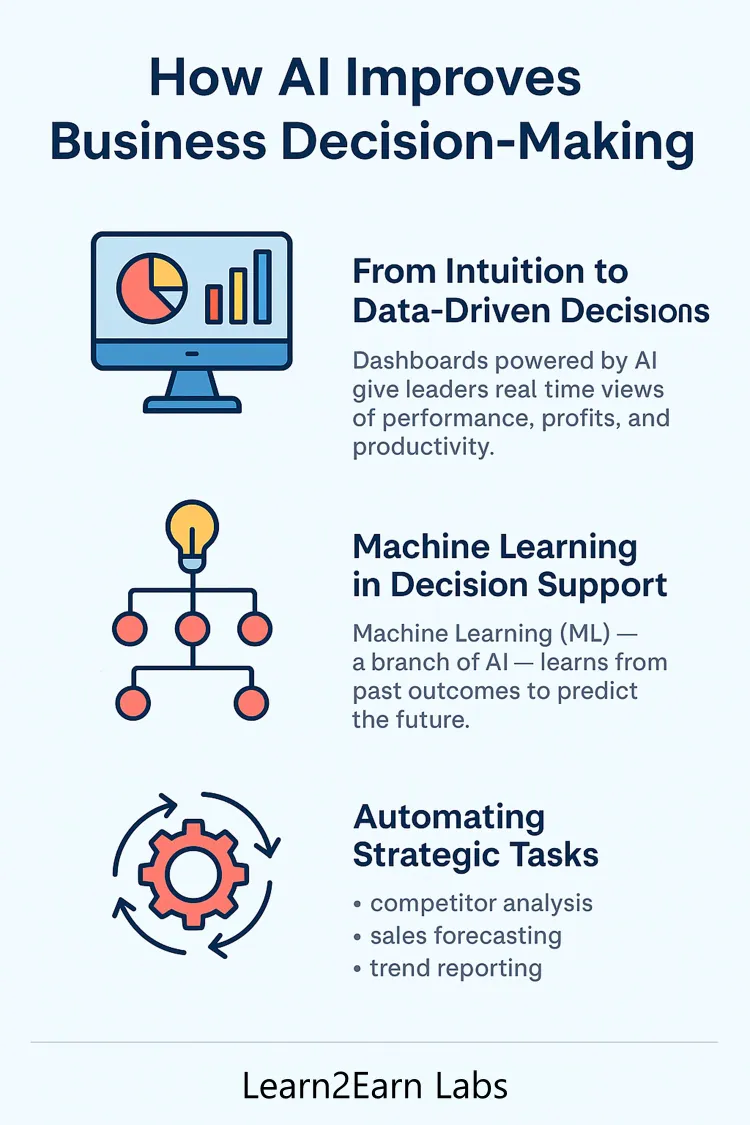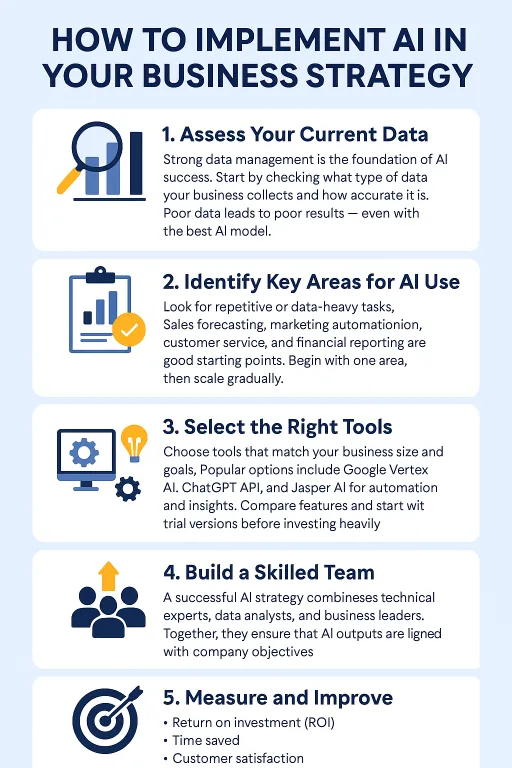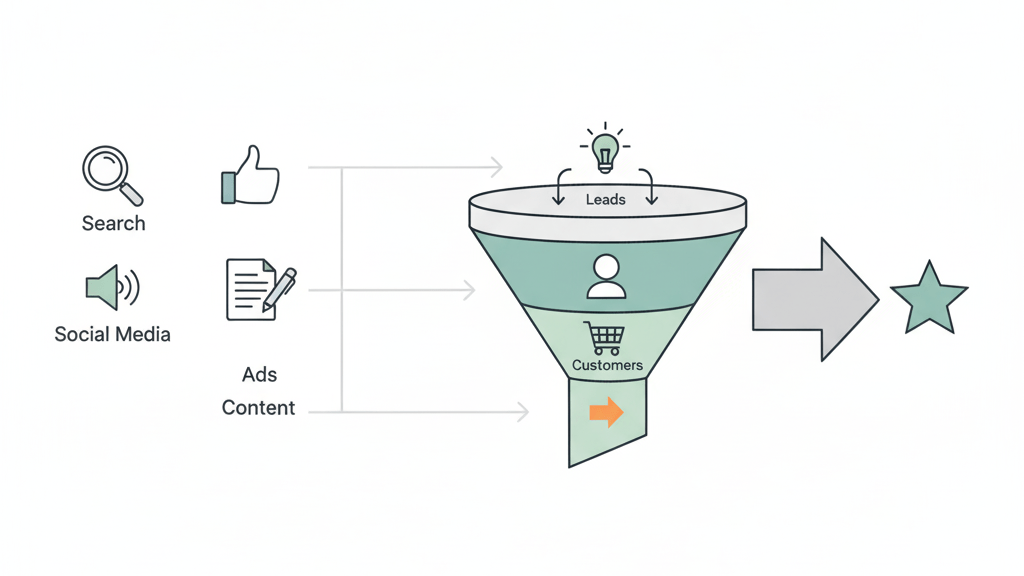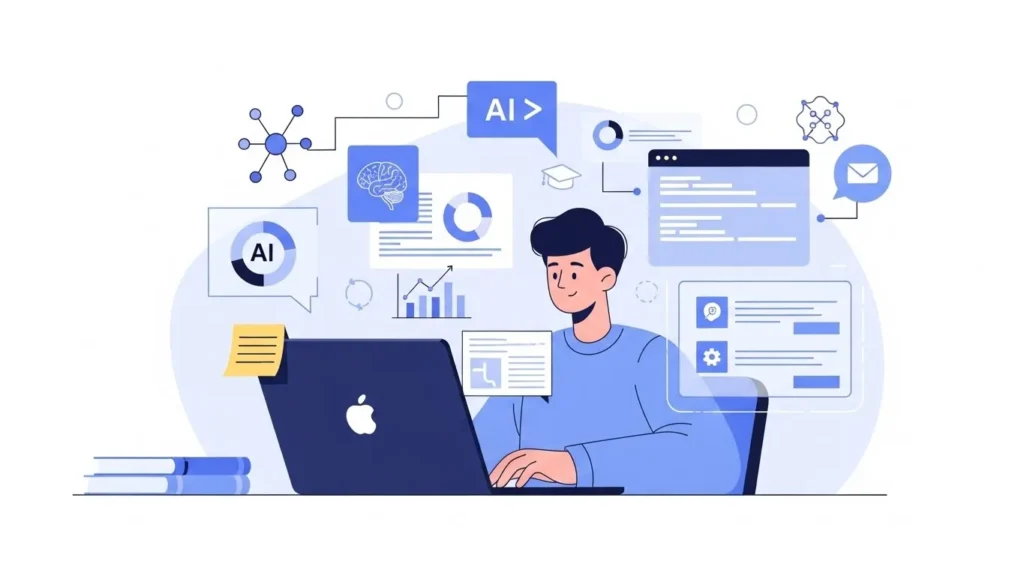AI for Business Strategy & Growth – How Artificial Intelligence Shapes Smarter Businesses

Artificial Intelligence, or AI, is changing the way businesses think and act.
It is not just about robots or coding anymore — it is about using smart systems to make better decisions.
Today, every successful organisation uses AI to plan strategies, reduce risks, and grow faster.
From startups to large corporations, AI helps convert huge amounts of data into clear insights.
In this blog, you will learn how AI supports business strategy and growth. You will also see how companies use AI to plan smarter, work efficiently, and stay ahead of competitors.
For a beginner’s explanation, read IBM’s overview of Artificial Intelligence.
Unlock the power of AI and take your business strategy to the next level
Table of Contents
ToggleUnderstanding the Role of AI in Business Strategy
What Is AI in Business Strategy?
AI in business strategy means using data-driven algorithms to guide planning, decisions, and actions.
Instead of relying only on human experience, businesses now depend on AI tools that analyse data and reveal hidden patterns.
For example, an AI system can study thousands of market trends in seconds. It can predict which products will perform well and which markets are most profitable.
This level of insight allows leaders to make confident decisions based on real data, not assumptions.
Why AI Matters for Business Growth
AI plays a vital role in every modern growth plan. It:
Reduces guesswork: AI provides accurate predictions instead of assumptions.
Saves time: It automates tasks like market analysis and customer segmentation.
Improves accuracy: AI identifies mistakes early, avoiding costly errors.
Boosts innovation: It highlights new opportunities for products or services.
AI does not replace human intelligence — it amplifies it. Humans still make the final call, but AI provides the evidence behind the decision.
Core Applications of AI in Strategic Planning
Predictive Analytics for Market Trends
Predictive analytics helps businesses plan the future. AI tools use past data to forecast customer demand, market changes, and competition.
For instance, Amazon applies predictive models to manage stock levels. When AI predicts a surge in orders, it adjusts inventory automatically — preventing stock shortages.
This kind of planning gives companies a competitive advantage by preparing for future needs.
Customer Insights and Market Segmentation
Understanding your customer is the key to business success.
AI tools such as HubSpot AI and Salesforce Einstein divide customers into meaningful groups based on habits, spending, and interests.
This segmentation helps marketers personalise campaigns. Instead of sending one message to everyone, businesses can speak directly to each group — improving engagement and sales.
Product Innovation and R&D
AI is not limited to analysis; it also supports creativity.
Coca-Cola uses AI to test flavour combinations and analyse feedback from social media before launching a new drink.
This approach reduces the cost of trial and error and shortens the research cycle.
See how companies innovate through AI in Harvard Business Review.
Strategic Risk Management
AI can identify potential business risks before they become serious.
Financial organisations, for example, use AI to detect unusual transactions and prevent fraud. Supply-chain companies use AI alerts to anticipate delays caused by weather or political events.
By predicting these risks, businesses stay stable even in uncertain times.
Turn data into decisions — learn how AI can help your career and business grow
How AI Improves Business Decision-Making
From Intuition to Data-Driven Decisions
Business decisions once depended on instinct or experience.
AI has changed that by providing evidence-based recommendations.
Dashboards powered by AI give leaders real-time views of performance, profits, and productivity.
When data supports the decision, confidence increases, and mistakes decrease.
Machine Learning in Decision Support
Machine Learning (ML) — a branch of AI — learns from past outcomes to predict the future.
A logistics company, for example, can use ML to find the fastest delivery routes, saving both time and fuel.
These algorithms continuously improve as they analyse more data, which makes business planning smarter over time.
Automating Strategic Tasks
AI also reduces the workload for managers by automating time-consuming tasks such as:
Competitor Analysis
Sales Forecasting
Trend Reporting
This automation allows leaders to focus on innovation, relationships, and new opportunities instead of routine work.

Real-World Examples of AI in Business Growth
Amazon’s Predictive Personalisation
Amazon collects customer behaviour data and uses AI to suggest relevant products.
This personalisation increases conversions and customer satisfaction.
AI also supports their pricing strategy by adjusting prices dynamically to meet demand.
Netflix’s AI-Driven Content Strategy
Netflix analyses millions of viewing patterns using AI.
The platform predicts which genres or actors will attract the most views and invests in those productions.
This approach keeps subscribers engaged and loyal.
Tesla’s Continuous Innovation
Tesla’s vehicles send data to the company every day.
AI analyses driving behaviour and road conditions to enhance self-driving features and improve safety.
This cycle of data and improvement keeps Tesla years ahead of competitors.
What We Learn from These Examples
Data fuels strategy.
AI insights help companies innovate continuously.
The balance between human creativity and AI analysis drives lasting growth.
Start your journey towards smarter, AI-driven business success today
How to Implement AI in Your Business Strategy
Step 1: Assess Your Current Data
Strong data management is the foundation of AI success.
Start by checking what type of data your business collects and how accurate it is.
Poor data leads to poor results — even with the best AI model.
Step 2: Identify Key Areas for AI Use
Look for repetitive or data-heavy tasks.
Sales forecasting, marketing automation, customer service, and financial reporting are good starting points.
Begin with one area, then scale gradually.
Step 3: Select the Right Tools
Choose tools that match your business size and goals.
Popular options include Google Vertex AI, ChatGPT API, and Jasper AI for automation and insights.
Compare features and start with trial versions before investing heavily.
Step 4: Build a Skilled Team
A successful AI strategy combines technical experts, data analysts, and business leaders.
Together, they ensure that AI outputs are aligned with company objectives.
Step 5: Measure and Improve
Track the performance of your AI initiatives using metrics such as:
-
Return on investment (ROI)
-
Time saved
-
Customer satisfaction
-
Error reduction
Keep refining your models and strategies as you learn more.

Challenges and Ethical Issues
Data Privacy and Security
AI depends on personal and company data.
Without strong security, this data may be exposed or misused.
Follow privacy laws such as GDPR and use encrypted systems to build trust with users.
Bias and Transparency
AI can unintentionally carry human bias from the data it learns.
Businesses should audit algorithms regularly and make results explainable to users.
Human–AI Collaboration
AI is powerful but lacks empathy and creativity.
Human oversight ensures that decisions stay ethical and customer-centred.
A balanced approach between automation and human judgment leads to the best outcomes.
The Future of AI in Business Growth
From Automation to Intelligence
AI is moving from basic automation to full strategic intelligence.
Future AI systems will not just execute orders — they will recommend growth plans, predict risks, and manage operations in real time.
Generative AI in Strategy Building
Generative AI tools like ChatGPT, Claude, and Gemini now assist with research, content creation, and business idea generation.
They speed up planning and spark creativity.
Emerging Trends to Watch
-
Explainable AI (XAI): focuses on making AI decisions easy to understand.
-
AI Governance: sets rules for safe and responsible use.
-
Sustainable AI: promotes energy-efficient and eco-friendly algorithms.
Businesses that adopt these practices will remain strong in an AI-first economy.
Conclusion
AI is the engine behind modern business growth.
It turns information into strategy, insight into innovation, and action into results.
Companies that embrace AI gain a clear competitive edge — they make faster decisions, reduce risks, and understand their customers better.
But success depends on thoughtful use. Combine human creativity with AI intelligence, and your business will not only grow but also evolve intelligently.
For more guidance on practical AI integration, visit Learn2Earn Labs.





